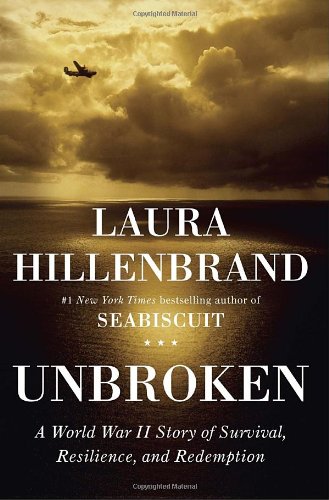Even if you think you know all about World War II, you'll see a slice of it you never knew in "Unbroken."
Author
Laura Hillenbrand tells the story of Louis Zamperini, an Olympic-class
distance runner called into service, like so many young American men, to
fight the Japanese.
After Zamperini's plane crashes in the Pacific, he
and the pilot survive for 47 harrowing days in a raft, battling hunger
and thirst, fending off attacking sharks and avoiding the bullets of
dive-bombing Japanese planes. And from there it gets worse: They are
captured by the Japanese and spend two years in POW camps, suffering
horrific abuse and torture.
Hillenbrand, the author of
"Seabiscuit," is meticulous in her research and she offers up
well-chosen details to give us a sense of time and place beyond
Zamperini's story. While the soldiers called to battle were eager and
determined, she notes, they were often young men of just 20 or 21 placed
in charge of warplanes of questionable quality. Far more planes,
Hillenbrand writes, were lost to accidents than combat.
In the
POW camps, prisoners were kicked and beaten by guards, and Zamperini was
tormented by a particularly sadistic nemesis known as "The Bird."
Prisoners were tied to trees for days in only their underwear in the
dead of winter. They were forced to do push-ups over trenches of human
waste. Enlisted U.S. prisoners were forced, one after the other, to hit
their American officers in the face (if they didn't hit hard enough,
they were beaten). Food was scarce; disease rampant. Hillenbrand reports that a third of Americans held by the Japanese died in POW camps,
compared to just 1% of Americans held by Germans in World War II.
Hillenbrand
notes that the Japanese justified their
mistreatment of captured Americans by calling some of them "unarmed
combatants" rather than prisoners of war. Since they weren't POWs, the
Japanese contended, the men had no rights at all. I guess this idea
didn't originate in Guantanamo Bay.
As painful as it is read the
POW camp accounts, the remarkable thing is that Zamperini and others
manage to persevere and survive. They get small portions of revenge by
playing jokes, smuggling in food or sabotaging the work they were
supposed to doing.
The book is perhaps 5% too long, which isn't
that bad, but at times, you may want to skim ahead. I read an Advance
Reader's Edition, which did not have any maps. It would be better if the
final version has maps.
---
(Please support this blog by clicking on an ad, or by donating via
the Paypal button below.)

No comments:
Post a Comment